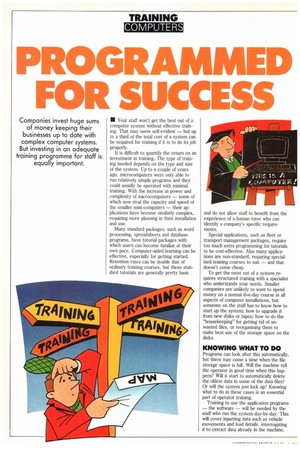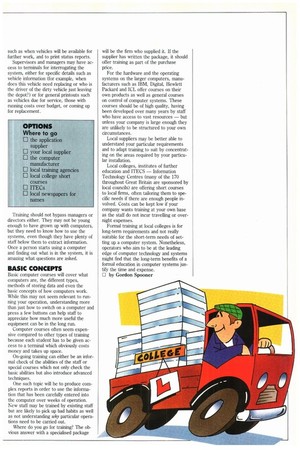PROGRAMMED FOR SUCCESS
Page 50

Page 51

If you've noticed an error in this article please click here to report it so we can fix it.
• Your staff won't get the best out of a computer system without effective training. That may seem self-evident — but up to a third of the total cost of a system can be required for training if it is to do its job properly.
It is difficult to quantify the return on an investment in training. The type of training needed depends on the type and size of the system. Up to a couple of years ago, microcomputers were only able to run relatively simple programs and they could usually be operated with minimal training. With the increase in power and complexity of microcomputers — some of which now rival the capacity and speed of the smaller mini-computers — their applications have become similarly complex, requiring more planning in their installation and use.
Many standard packages, such as word processing, spreadsheets and database programs, have tutorial packages with which users can become familiar at their own pace. Computer-aided learning can be effective, especially for getting started. Retention rates can be double that of ordinary training courses, but these standard tutorials are generally pretty basic and do not allow staff to benefit from the experience of a human tutor who can identify a company's specific requirements.
Special applications, such as fleet or transport management packages, require too much extra programming for tutorials to be cost-effective. Also many applications are non-standard, requiring specialised training courses to suit — and that doesn't come cheap.
To get the most out of a system requires structured training with a specialist who understands your needs. Smaller companies are unlikely to want to spend money on a normal five-day course in all aspects of computer installations, but someone on the staff has to know how to start up the system; how to upgrade it from new disks or tapes; how to do the "housekeeping" for getting rid of unwanted files, or reorganising them to make best use of the storage space on the disks.
KNOWING WHAT TO DO
Programs can look after this automatically, but there may come a time when the file storage space is full. Will the machine tell the operator in good time when this happens? Will it start to automatically delete the oldest data in some of the data files? Or will the system just lock up? Knowing what to do in these cases is an essential part of operator training.
Training to use the application programs — the software — will be needed by the staff who run the system day-by-day. This will cover inputting data such as vehicle movements and load details, interrogating it to extract data already in the machine, such as when vehicles will be available for further work, and to print status reports.
Supervisors and managers may have access to terminals for interrogating the system, either for specific details such as vehicle information (for example, when does this vehicle need replacing or who is the driver of the dirty vehicle just leaving the depot?) or for general printouts such as vehicles due for service, those with running costs over budget, or coming up for replacement.
Training should not bypass managers or directors either. They may not be young enough to have grown up with computers, but they need to know how to use the systems, even though they have plenty of staff below them to extract information. Once a person starts using a computer and finding out what is in the system, it is amazing what questions are asked.
BASIC CONCEPTS
Basic computer courses will cover what computers are, the different types, methods of storing data and even the basic concepts of how computers work. While this may not seem relevant to running your operation, understanding more than just how to switch on a computer and press a few buttons can help staff to appreciate how much more useful the equipment can be in the long run.
Computer courses often seem expensive compared to other types of training because each student has to be given access to a terminal which obviously costs money and takes up space.
On-going training can either be an informal check of the abilities of the staff or special courses which not only check the basic abilities but also introduce advanced techniques.
One such topic will be to produce complex reports in order to use the information that has been carefully entered into the computer over weeks of operation. New staff may be trained by existing staff but are likely to pick up bad habits as well as not understanding why particular operations need to be carried out.
Where do you go for training? The obvious answer with a specialised package will be the firm who supplied it. If the supplier has written the package, it should offer training as part of the purchase price.
For the hardware and the operating systems on the larger computers, manufacturers such as IBM, Digital, Hewlett Packard and ICL offer courses on their own products as well as general courses on control of computer systems. These courses should be of high quality, having been developed over many years by staff who have access to vast resources — but unless your company is large enough they are unlikely to be structured to your own circumstances.
Local suppliers may be better able to understand your particular requirements and to adapt training to suit by concentrating on the areas required by your particular installation.
Local colleges, institutes of further education and ITECS — Information Technology Centres (many of the 170 throughout Great Britain are sponsored by local councils) are offering short courses to local firms, often tailoring them to specific needs if there are enough people involved. Costs can be kept low if your company wants training at your own base as the staff do not incur travelling or overnight expenses.
Formal training at local colleges is for long-term requirements and not really suitable for the short-term needs of setting up a computer system. Nonetheless, operators who aim to be at the leading edge of computer technology and systems might find that the long-term benefits of a formal education in computer systems justify the time and expense.
LI by Gordon Spooner




















































































































































